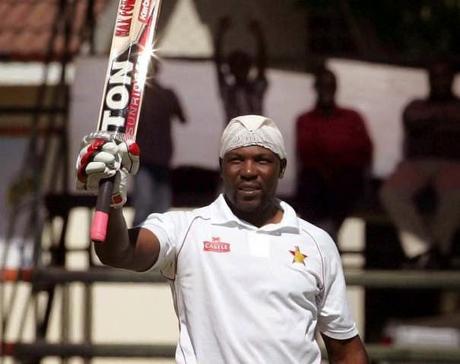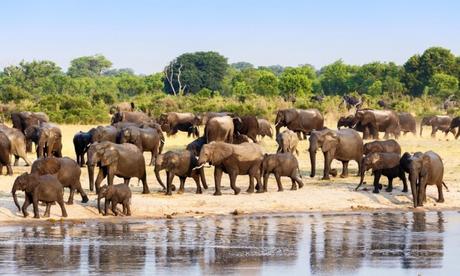 At Hamilton
Masakadza ton led Zimbabwe to an upset victory over Sri Lanka in both teams’
final warm-up before the ICC Cricket World Cup, running down Sri Lanka’s 279
with seven wickets in hand and 4,4 overs to spare in Lincoln yesterday. Masakadza remained unbeaten on 117 from 119
balls, having forged hundred-stands with both Brendan Taylor and Sean Williams,
who hit fifties. Many will remember
Zimbabwe beating famed Aussies in 1983 WC and pinning India down at 17 for 5
before cavalier Kapil Dev played innings of life. Even die-hard fans may not
remember Charles Coventry who for sometime held the World record for most runs
in ODI along with Saeed Anwar before Sachin Tendulkar hit the first ever 200 in
ODI.
Back home in
Zimbabwe, more than 80 young elephants are being held in a capture facility in
Hwange National Park, in Zimbabwe, according to sources monitoring the
situation there. News of Zimbabwe’s plan
to export 27 young elephants to
Thailand and 60 to China have evoked
strong criticism. Such export though is
legal under the Convention on International Trade in Endangered Species of Wild
Fauna and Flora (CITES), the global treaty organization that sets rules for and
monitors trade in live animals.
Now comes the news
that Zimbabwe has defended its plan to export 27 live elephants to China,
saying it has sent experts to assess the suitability of the Chinese zoos they
are destined for. A Zimbabwean ambassador also said that the sale of the
elephants is needed to raise funds for conservation efforts, echoing earlier
comments by officials at the country’s cash-strapped Hwange national park. At
least 62 elephants, some of them calves, were reportedly removed from the park
last year and are to be exported to countries including China, the United Arab Emirates
and France.
At Hamilton
Masakadza ton led Zimbabwe to an upset victory over Sri Lanka in both teams’
final warm-up before the ICC Cricket World Cup, running down Sri Lanka’s 279
with seven wickets in hand and 4,4 overs to spare in Lincoln yesterday. Masakadza remained unbeaten on 117 from 119
balls, having forged hundred-stands with both Brendan Taylor and Sean Williams,
who hit fifties. Many will remember
Zimbabwe beating famed Aussies in 1983 WC and pinning India down at 17 for 5
before cavalier Kapil Dev played innings of life. Even die-hard fans may not
remember Charles Coventry who for sometime held the World record for most runs
in ODI along with Saeed Anwar before Sachin Tendulkar hit the first ever 200 in
ODI.
Back home in
Zimbabwe, more than 80 young elephants are being held in a capture facility in
Hwange National Park, in Zimbabwe, according to sources monitoring the
situation there. News of Zimbabwe’s plan
to export 27 young elephants to
Thailand and 60 to China have evoked
strong criticism. Such export though is
legal under the Convention on International Trade in Endangered Species of Wild
Fauna and Flora (CITES), the global treaty organization that sets rules for and
monitors trade in live animals.
Now comes the news
that Zimbabwe has defended its plan to export 27 live elephants to China,
saying it has sent experts to assess the suitability of the Chinese zoos they
are destined for. A Zimbabwean ambassador also said that the sale of the
elephants is needed to raise funds for conservation efforts, echoing earlier
comments by officials at the country’s cash-strapped Hwange national park. At
least 62 elephants, some of them calves, were reportedly removed from the park
last year and are to be exported to countries including China, the United Arab Emirates
and France.
 Conservationists
have condemned the plan as barbaric, and over 50,000 people have signed a
petition against it. Accroding to Zimbabwe’s ambassador to the EU, the export of
the elephants was allowed under the wildlife trade convention, Cites. Cites
says the trade in the animals is permitted, provided authorities “minimise the
risk of injury, damage to health or cruel treatment” during their transport.
To many, separating baby elephants from their herds is
cruel and traumatic. Elephants are highly sociable animals and need many years
of parental support before they are able to survive away from their herds. Moreover,
there is a very real risk that those herds affected will take out their
frustration on unsuspecting tourists for many years to come. There is also fear of the safety of such
exported animals in China as there are
no animal welfare regulations or laws in China that regulate how zoos are run.
These animals have been taken from the wild, which sends a very wrong signal to
the public. The wild is where these elephants truly belong.
The collapse in
tourism in Zimbabwe has hit national parks and conservation programmes. Hwange
has too many elephants – 43,000 in a park capable of supporting 15,000 –
according to the director for conservation at the Zimbabwe Parks and Wildlife
Authorities. The fact that elephants could sell for up to $60,000 (£39,000)
each to help the $2.3m annual running costs of the park, is making them resort
to this move. The Guardian quotes Zimbabwe
Conservations Taskforce director as
saying that the elephants are between
two-and-a-half and five years old and are being sent under conditions of tight
security by container trucks to Maputo in Mozambique for transfer to a
livestock sea freighter bound for China.
Are these baby
elephants “ivory orphans” taken as they stand grieving at the bloody corpses of
their mothers and sisters? Or were they dragged forcibly from their mothers, or
stolen away in the night? One is pained
to ask ?? – whatever be the circumstances of their capture One can hardly imagine the physical and emotional
torment these animals will suffer: confined, alone and frightened on the long
voyage to China. Elephant mothers suckle their young for five
years, which means that many of the elephants bound for China, some as young as
two-and-a-half years old, were not physically prepared to be separated from
their mothers. The emotional bond
between mother and offspring lasts much longer.
Experts say that elephants take care of the sick and comfort the dying.
Zimbabwe is not
alone. Conservationists have hit out at
attempts by Tanzania to hold a one-off sale of its ivory stockpile and
downgrade the level of protection for the country's elephants. The east African country has formally applied
to the Convention on International Trade in Endangered Species (Cites) to allow
it to hold a sale of more than 100 tonnes of ivory to Japan and China. The country says the proceeds from the sale
would be used exclusively for elephant conservation, community conservation and
development programmes within or next to the animal's range in Tanzania.
Four African
countries were given permission to sell their legally held stocks of ivory in
2008, which conservationists argue stimulated the market and provided a cover
for traders to offload illegal stocks.
With regards – S.
Sampathkumar
Conservationists
have condemned the plan as barbaric, and over 50,000 people have signed a
petition against it. Accroding to Zimbabwe’s ambassador to the EU, the export of
the elephants was allowed under the wildlife trade convention, Cites. Cites
says the trade in the animals is permitted, provided authorities “minimise the
risk of injury, damage to health or cruel treatment” during their transport.
To many, separating baby elephants from their herds is
cruel and traumatic. Elephants are highly sociable animals and need many years
of parental support before they are able to survive away from their herds. Moreover,
there is a very real risk that those herds affected will take out their
frustration on unsuspecting tourists for many years to come. There is also fear of the safety of such
exported animals in China as there are
no animal welfare regulations or laws in China that regulate how zoos are run.
These animals have been taken from the wild, which sends a very wrong signal to
the public. The wild is where these elephants truly belong.
The collapse in
tourism in Zimbabwe has hit national parks and conservation programmes. Hwange
has too many elephants – 43,000 in a park capable of supporting 15,000 –
according to the director for conservation at the Zimbabwe Parks and Wildlife
Authorities. The fact that elephants could sell for up to $60,000 (£39,000)
each to help the $2.3m annual running costs of the park, is making them resort
to this move. The Guardian quotes Zimbabwe
Conservations Taskforce director as
saying that the elephants are between
two-and-a-half and five years old and are being sent under conditions of tight
security by container trucks to Maputo in Mozambique for transfer to a
livestock sea freighter bound for China.
Are these baby
elephants “ivory orphans” taken as they stand grieving at the bloody corpses of
their mothers and sisters? Or were they dragged forcibly from their mothers, or
stolen away in the night? One is pained
to ask ?? – whatever be the circumstances of their capture One can hardly imagine the physical and emotional
torment these animals will suffer: confined, alone and frightened on the long
voyage to China. Elephant mothers suckle their young for five
years, which means that many of the elephants bound for China, some as young as
two-and-a-half years old, were not physically prepared to be separated from
their mothers. The emotional bond
between mother and offspring lasts much longer.
Experts say that elephants take care of the sick and comfort the dying.
Zimbabwe is not
alone. Conservationists have hit out at
attempts by Tanzania to hold a one-off sale of its ivory stockpile and
downgrade the level of protection for the country's elephants. The east African country has formally applied
to the Convention on International Trade in Endangered Species (Cites) to allow
it to hold a sale of more than 100 tonnes of ivory to Japan and China. The country says the proceeds from the sale
would be used exclusively for elephant conservation, community conservation and
development programmes within or next to the animal's range in Tanzania.
Four African
countries were given permission to sell their legally held stocks of ivory in
2008, which conservationists argue stimulated the market and provided a cover
for traders to offload illegal stocks.
With regards – S.
Sampathkumar
12th Feb 2015.

